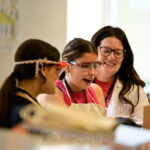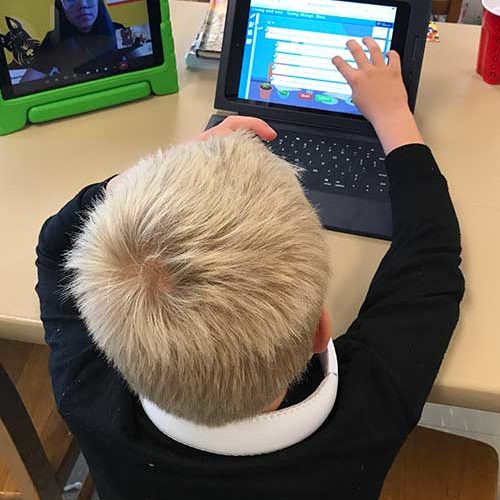
Wooster students volunteer to support Wooster City School students through online program

For education majors, experience working closely with students in the classroom is a crucial part of their education. When the teaching and learning environment changed for schools this fall, education faculty at The College of Wooster came up with a solution that gives students that crucial experience and addresses an important need in the community. More than 85 Wooster students—including education and other majors—are volunteering to provide remote tutoring for kindergarten through 12th grade students at Wooster City Schools on a variety of subjects. Using an online booking system, Wooster City School students (and parents) scheduled more than 103 sessions in the first three weeks of the program. The volunteers provide 30-minute sessions of additional assistance on specific concepts or skills the WCS students are looking to improve such as homework problems, content review, practicing foreign language skills, and help with reading, writing, and mathematics.
“As we thought about how we could really support the community through this challenge, we knew we had so many students on campus who wanted to help in some way and to be engaged in this community,” said Matthew Broda, associate professor and chair of Education at the College. Opening up the program to Wooster students from all majors, even those not studying on campus this fall, “allows them to still be a part of a purpose driven, mission driven experience, with the college from their alternate location,” said Broda. “It gives those students an opportunity to still be a part of this larger project when they’re not able to be here in this physical space. They’re still able to contribute and do some really cool things from home,” he said. Broda referenced one student studying remotely at Wooster this fall from South Korea who told the WCS student on the line, “I’m 13 hours ahead of you right now.” “It’s been really cool to see,” said Broda. “This is a way for him to fill his evening and feel like he’s doing something good and connect with kids over here.”
Wooster students participating in the program complete an online training program and receive access to resources that help them to address students’ needs. The volunteers are broken down into four teams lead by education majors preparing to student teach, who create weekly tutor tip emails, check-in with tutors before and after sessions and act as “caretakers” for the other tutors. “I love having the opportunity to work with WCS students remotely and helping to create a program that supports students,” said Jayne Blinkhorn ’21, a senior and double major in chemistry and education. “This experience allows me to work with a group of my peers from a variety of majors and interests that I might not have had the chance to work with otherwise, and I’m grateful for their insights and everything that I’ve learned from them. I will also gain more experience working with a variety of learners from different grade levels, which will allow me to better anticipate and adapt to students’ needs when I have my own classroom following graduation.”
Seeing students learn from their interactions on video calls has been encouraging for Sarah Dunlap, director of field assessment and engagement for Education Department at Wooster. “They’re really engaging and making the high school students really think about how they’re thinking, not just giving them the answer,” she said. “They’re taking away soft skills and learning about how to talk to a younger person.” In additional to the professionalism and practice in a real-world setting, Broda sees students really learning to think quickly, multitask, and address unexpected questions on the spot. “It’s been really neat to see them solve those kinds of problems where you have to keep the person in front of you engaged, while at the same point, backfill all of the information you need to make your next interaction really purposeful and meaningful,” said Broda. English and education major Morgan Fields ’21 sees this as the “most important skill” she’s taking away. “The remote atmosphere requires each tutor to think outside the box and use a variety of resources they may not otherwise use,” she said, explaining that she’s never had to teach a student to use a protractor without one on hand. “The experience has pushed me to use online resources I may not have otherwise known about, and those are resources and skills I can take with me and utilize in my own classroom next year.”
As the program continues this fall, Broda stressed, “This is only the beginning. I think it will become a more relied upon tool as it goes,” noting that they continue to partner with Wooster City Schools to further develop the program to meet the needs of parents and students. “Our ultimate goal is we would eventually like to say we can’t handle anymore,” he said with a smile. “We would want our tutors to say, okay, we’re, we’re done. We can’t take any more people.” While they may reach that limit, for the students, “It’s been amazing watching students from all disciplines at the College come together to work towards such an important cause,” said Fields. “They are taking time out of their own schedules to work with students whom they’ve never met on homework and topics they’ve never seen. That is incredible to me; it shows how wonderful our student body truly is, and it’s a student body I’m endlessly proud to be a part of.”
Posted in Experiential Learning, News on October 13, 2020.
Related Posts
Related Areas of Study
Education
Graduate as a licensed teacher in pre-K-12 in fields ranging from science to music education
Major Minor Teaching Licensure

